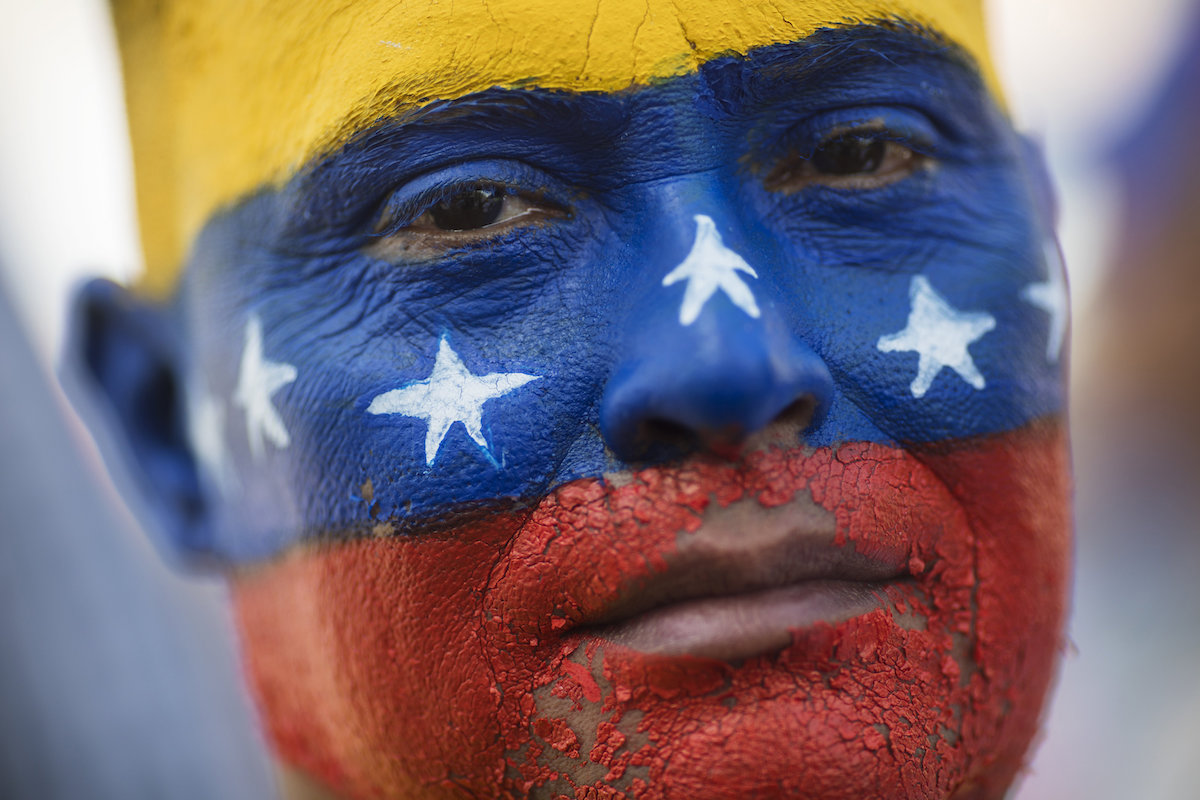

In this Saturday, November 16, 2019 photo, May Vera eyes the camera during a demonstration led by opposition politician Juan Guaido, who’s urging masses into the streets to force President Nicolás Maduro from power, in Maracaibo, Venezuela. (AP Photo/Rodrigo Abd)
A La Calle is a new documentary about Venezuela that premiered on September 15, International Day of Democracy, on HBO Max. Directed by Maxx Caicedo and Nelson Navarrete, it follows the latest string of documentaries that try to shed a new light on the sociopolitical crisis affecting the South American nation, which includes productions such as 2020’s Sundance entry Once Upon a Time in Venezuela and 2018’s Women of the Venezuelan Chaos.
However, since lots of context and information is usually very difficult to convey while explaining an already complex reality, some questions arise: Was the country really as stable and democratic in the past as many proclaim? What was Venezuela really like before Hugo Chávez?
To help to provide an answer, or at least some important background, here are three documentaries that are available online at no cost.
Tiempos de Dictadura: Tiempos de Pérez Jiménez (2012)
https://www.youtube.com/watch?v=H-qoTKAwwKE
In 1948 Rómulo Gallegos became the first democratically-elected president of Venezuela. A center-left writer and politician, he pursued a 50 percent tax on foreign oil companies. Later that same year Gallegos was ousted by a military coup, replaced first by a junta and then the dictatorship of Marcos Pérez Jiménez. A U.S.-backed army general who was friends with Argentina’s Juan Perón, Spain’s Francisco Franco and the Dominican Republic’s Rafael Trujillo, Pérez Jiménez banned leftist parties, censored the press and persecuted dissidents, while oil revenues financed a mirage of tropical opulence that some Venezuelans still look back on fondly today.
Tiempos de Dictadura tries to provide a full image of life under Pérez Jiménez with testimonies from a broad spectrum of political activists, journalists and other personalities of the time, along with extensive footage, most of which hasn’t been seen in decades. It can’t help falling into a nostalgic mood for the lighter side of the ’50s, which affects the overall tone of the documentary. Nonetheless, it serves as an introduction to the start of the bipartisan system -known as the Puntofijo Pact- which ruled the country during the latter half of the 20th century up until Hugo Chávez’s rise to power.
CAP 2 Intentos (2006)
Carlos Andrés Pérez is one the most controversial leaders in Venezuela’s recent history. His first presidential term (1973-1978) oversaw the nationalization of oil and gas, which in turn helped to fund extensive infrastructure and social programs to modernize the country, some of which, like the National Youth Orchestra System, still remain today. Pérez’s legacy, however, is mired by a disastrous second term (1988-1993) amid failing oil prices and Latin America’s “Lost Decade.” It started with social unrest and dozens dead after the Venezuelan government tried implementing IMF-advised austerity measures, barely managed to hold together through two coup attempts -including one which gave a young army major by the name of Hugo Chávez his first bit of spotlight- and ended in an impeachment, jail, endless trials and a self-imposed exile in Miami.
CAP 2 Intentos is an engaging portrayal of the man who created, embodied, and destroyed the myth of Venezuela’s exceptionalism in Latin America. The documentary suffers from a lack of diverse voices ‒about half of them are former cabinet members trying to justify their actions‒ and it’s certainly apologetic of Pérez. But it’s still a good resource for understanding the time and mindset nicknamed by some as “The Greater Venezuela,” and by others, more memorably, as “Saudi Venezuela.”
Venezuela: Los Guerrilleros al Poder (1997)
Anything could happen in 1990s Venezuela. The bipartisan system that had run the country since Pérez Jiménez’s ousting in 1958 was falling apart, and it was uncertain which political forces would replace it. Parties such as Movimiento Al Socialismo, founded in 1970 by former guerrilla fighters disenchanted with Soviet-style communism after an amnesty, were winning city halls and state legislatures while the military officers who tried to oust the unpopular Pérez had the sympathy of the media and the general public.
Although Hugo Chávez is not directly addressed in Los Guerrilleros al Poder, one can’t help feeling that the entire documentary provides a prelude to his presidential victory in December 1998 – from the interviews; to Teodoro Petkoff and Pompeyo Márquez, important guerrilla leaders in the ’60s who became Chavismo’s most important critics on the left; passing by Chávez’s fellow conspirator and Maduro’s current ambassador in Mexico, Francisco Arias Cárdenas; to a focus on Douglas Bravo, widely regarded as Chávez’s political mentor and an early ally who, unlike Márquez and Petkoff, never accepted surrender.
This documentary is a great reference for understanding the ambivalence of Venezuela’s left at the time, torn between reforming an established democracy that many felt no longer represented the majority on the one hand and, on the other, the promise of revolution and settling scores with the status quo.
***
José González Vargas is a Venezuelan journalist who has written for several outlets, including Latino USA, Latino Rebels, Caracas Chronicles and Into. He tweets from @Maxmordon.


